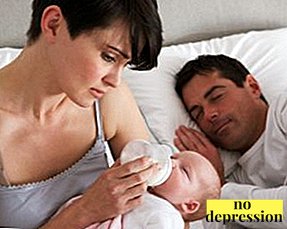Hello. I read the article "How to forget a loved one" with mixed feelings. It seems everything is correct, but I still want to add that the loved ones are forgotten, but the relationship is not. And whether you want or not, and in the following respects you are looking for what was ...
I would like to ask a question.
I married at 31, I didn’t feel or love anything about my husband. It didn’t work out as it was supposed to - they separated in three years. I told myself that I would never live with an unloved person again. In 36, met her man, loved him, wanted children from him. He left. And married a girl from his childhood, who waited all his life. I forgot it, but our relationship is not.
 I recently met a man in whom I see myself and I understand, he is the one I need. Fell in love, of course. And he loves another, a girl from his past, and is waiting for her. It's funny ...
I recently met a man in whom I see myself and I understand, he is the one I need. Fell in love, of course. And he loves another, a girl from his past, and is waiting for her. It's funny ...
Stay friends. I love to communicate with him.
Among my acquaintances, there is a person who has been telling me for a year and a half that he loves one and waits for me. And I can not tolerate him, he is not my man and I can see too well.
I would like to know, so be with whom? Who to wait? What to strive for? To the one whom you love, and who for one reason or another will leave you, or to the one who is indifferent to you, but for some reason does he need you?
Elena, Volgograd
Psychologist's answer:
You made an excellent remark at the very beginning of your letter: “I would like to add that your loved ones are forgotten, but the relationship is not. And whether you want it or not, in the following relationship you look for what was ...”.
In fact, all psychology is built on this thought, if you dig it a little deeper. In each new relationship, we are looking for the past, but the past is much more distant than, I suppose, you write. We are looking for a repetition of our earliest childhood relationships - with mom, dad, grandmother, grandfather, sisters and brothers (sometimes you can include other significant persons: aunts and uncles, first caregivers and nannies, stepfathers and stepmother, etc.).
And then I have the opposite questions for you: What happened in your childhood? How did the relationship between the parents? What was your relationship with your parents? What did you conclude that there are only two scenarios:
- To love, but not to be together;
- To be together, but not to love.
But maybe this contradiction protects you from something? And if so, why?
You can say that this life has taught you this, but practice shows that our life is only a reflection of our expectations, beliefs and beliefs.
For example, you write: “I married at 31, I did not feel and did not love my husband. It didn’t work out, as it was supposed to, they separated in three years.” Surprisingly, from the very beginning you seemed to know that nothing would work out, and, as a result, it did not work out ...
 You ask important questions: "I would like to know, so who to be with? Whom to wait? What should I strive for?", But I cannot answer them. After all, this is your life, and only you can decide with whom to be, whom to wait and what to strive for, which means that you yourself will have to look for answers to these questions.
You ask important questions: "I would like to know, so who to be with? Whom to wait? What should I strive for?", But I cannot answer them. After all, this is your life, and only you can decide with whom to be, whom to wait and what to strive for, which means that you yourself will have to look for answers to these questions.
I would suggest to start thinking with questions that I mentioned earlier (about family and protection). And then fantasize about what you basically want from life and men, what is achievable in reality and what compromises you are ready to make. That is, expand your horizons and see that there are more scenarios in life than "To love, but not to be together / To be together, but not to love."
I also want to share with you one feeling: you seem to be talking about relationships with men, based on the principle of "all or nothing." In general, you have every right to do so. In the event that you realize that "nothing" has the same chances of accomplishment, as well as "everything" ...
I understand that I did not give you any answers, but only asked a lot more than other questions. But this is exactly how psychologists work: I do not know you, your experience and your soul, and you know everything; I can ask questions, and you can find answers to them; I can light a flashlight, but only you can step onto the change track.
Therefore, if you have additional questions or comments, please contact the email address listed on my page on the site (see the signature below). If you want to discuss your feelings and experiences in the format of counseling, you can arrange an in-person meeting in Moscow or a Skype-consultation at a convenient time for you.
Consultant Psychologist, Ksenia Terentyeva



